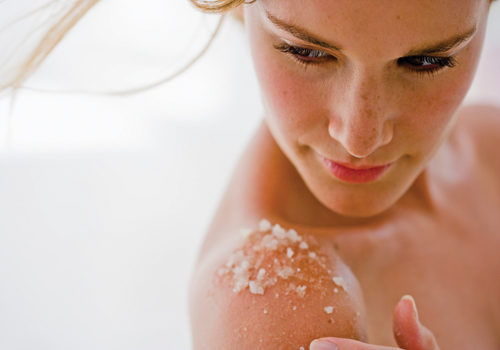With winter upon us, cold air leaves skin feeling rough and dry. To combat Old Man Winter, we’ve seen a resurgence of sea-derived skincare ingredients that are beneficial for all skin types by reducing signs of aging, rejuvenating dehydrated skin and supporting healthy skin.
Dead Sea Salt and Minerals
Through the ages, people have flocked to the Dead Sea looking to treat many medical conditions. The Dead Sea is said to be the richest source of natural minerals in the world due to its 32% concentration of dissolved minerals (1). Exposure to its environmental conditions (i.e., climatotherapy) and the high salinity level offers many therapeutic benefits (1). Dead Sea salts contain 21 minerals including magnesium, calcium, sulfur, bromide, iodine, sodium, zinc and potassium (2).
The naturally high content of magnesium chloride, which stands at a level of 46% in the crystalline form, gives the Dead Sea its cosmetic credibility. The sea’s high magnesium content allows skin to retain water, keeping it hydrated (3). A big contributor to the skin’s natural moisturizing factor is its ability to absorb minerals (1). Magnesium salt products such as bath-dissolved salts or mineral-rich preparations offer anti-inflammatory properties and help skin absorb electrolytes to benefit recovery (1).
Professors at the University of Kiel conducted a study to “examine the efficacy of bathing atopic subjects in a salt rich in magnesium chloride from deep layers of the Dead Sea” (3). After three weeks, subjects with atopic dry skin found a significant decrease in roughness after submerging their arms in a bath solution containing 5% Dead Sea salt. There was also a slight decrease in roughness after participants’ arms were submerged in tap water (3).
Salt Products: What to Know
Many mainstream salts are processed and stripped of their natural minerals, leaving behind a non-bioavailable product of only sodium and chloride that inhibits mineral absorption and requires the use of already absorbed minerals to break down the two elements. It is important to know the difference between natural sea salts and regular table salts when choosing bath salt products.
Natural unprocessed sea salt has irregularly shaped pieces, tends to be moist and clumps and sometimes appears off-white. Just remember, if it’s white and “looks perfect,” it has been highly processed and stripped of its natural elements (4).
The Scoop on Mud and Clay Masks
Mud or clay masks can be harsh on the skin when used or chosen incorrectly. According to skincare and natural health experts Myra Michelle Eby and Karolyn A. Gazella, determining skin type is key for understanding a skincare routine. Variables such as hormones, climate and weather, sun exposure, health problems, medications, diet, lifestyle and genetics contribute to our skin’s health and fluctuation. Mud masks should be hydrating and may contain antioxidants, such as blueberries, as well as essential oils like rosemary and totarol. They should be applied twice a week. However, for deep cleaning or support for oily skin, a detoxifying kaolin mud mask can be used once a month (5).
Mud and clay masks, when combined with other ingredients, may be beneficial for healthy skin. Masks with honey can help add moisture without increasing oiliness. For sensitive skin, ingredients like aloe vera, witch hazel and jojoba oil will also help soothe and heal skin. Also, natural extracts such as lavender, lemon grass, grapefruit, rosemary, clary or juniper can relieve acne-prone skin (6).
Benefits of Seaweed
Seaweed is also known for its many benefits to skin. Here are some types of seaweed that hold different therapeutic components (5, 7–8):
•Alginic acid increases nutrient absorption (laminaria digitata).
•Amino acids alleviate flaking and scaling (bladderwrack, rainbow).
•B-complex vitamins benefit those with acne (winged kelp, laminaria digitata, rockweed, rainbow).
•Beta-carotene offers antioxidant properties (rainbow, laminaria digitata).
•Fucoidan is a natural anti-inflammatory (bladderwrack).
•Iodine supports healthy pH levels (bull kelp, rockweed).
•Magnesium benefits skin tissue and provides skin with anti-
allergic elements (rainbow).
•Potassium, protein and calcium support muscle and cell production, and pH levels (bladderwrack, bull kelp).
•Vitamin A is an anti-inflammatory agent and benefits acne (rockweed).
•Vitamin C supports collagen production (winged kelp, laminaria digitata, rockweed).
•Vitamin E is a natural antioxidant and moisturizer (rockweed).
•Zinc supports damaged tissue (rainbow). WF
References
1. U. Katz, et al., “Scientific Evidence of the Therapeutic Effects of Dead Sea Treatments: A Systematic Review,” Semin Arthritis Rheum, in press 2012, http://193.146.160.29/gtb/sod/usu/$UBUG/repositorio/10321964_katz.pdf, accessed Oct. 22, 2012.
2. San Francisco Salt Company, “Dead Sea Mineral Salt Benefits,” http://www.sfbsc.com/dead-sea-salt-benefits, accessed Nov. 12, 2012.
3. E. Proksch, et al., “Bathing in a Magnesium-Rich Dead Sea Salt Solution Improves Skin Barrier Function, Enhances Skin Hydration, and Reduces Inflammation in Atopic Dry Skin,” Int. J. Dermatol. 44 (2), 151–157 (2005), http://onlinelibrary.wiley.com.ezproxy.rowan.edu/doi/10.1111/j.1365-4632.2005.02079.x/pdf, accessed Oct. 22, 2012.
4. Seaweed Bath Company, “Salts: The Good and The Bad,” www.seaweedbathblog.com/salts-the-good-and-the-bad/, accessed Nov. 12, 2012.
5. M.M. Eby and K.A. Gazella, Return to Beautiful Skin: Your Guide to Truly, Effective, Nontoxic Skin Care (Basic Health Publications, 2008).
6. WebMD, “Grooming Essentials for Women: Skin and Hair Care Products,” www.webmd.com/healthy-beauty/features/grooming-essentials-women-skin-hair-care-products, and “Coping with Acne,” www.webmd.com/skin-problems-and-treatments/acne/acne-care-11/oily-skin, accessed Nov. 28, 2012.
7. Sea Flora, “About Seaweeds,” www.sea-flora.com/seaweed.php, accessed Nov. 12, 2012.
8. Seaweed Bath Company, “Bladderwrack Seaweed,” www.seaweedbathco.com/our-natural-ingredients, accessed Nov. 19, 2012.
Published in WholeFoods Magazine, January 2013









